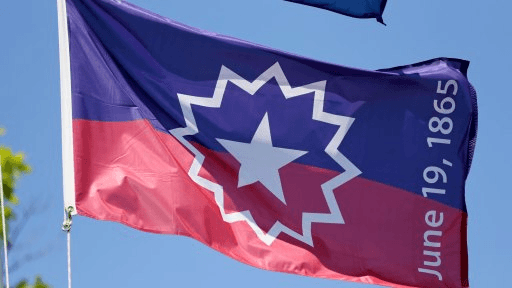Continuing with part II in the Creative Expressions Celebrating Juneteenth series, I want to tie how Miss Juneteenth the beautiful film that came out in 2020 ties into how Black Texans have celebrated this day to keep the legacy alive.
Now I’ve seen this film several times. Good thing I bought it huh? Anyway, I want to share just a glimpse of what I took away from the film as well as how it plays such a key role in keeping the Juneteenth legacy alive today.
It wasn’t that Turquoise wanted so badly to be Miss Juneteenth. It’s that she wanted the very essence of what Miss Juneteenth meant to fill her soul. She wanted to belong to something that placed her into an “acceptable” group of people. And that yearning is what pushed her to encourage her daughter to compete in the Miss Juneteenth pageant.
What I really felt was an emotional arc in the film was the fact that Turquoise could have competed in any pageant. She was a cute girl, right? But it was something about being Miss Juneteenth that she saw opportunity in. And throughout the film we saw there was much deeper meaning to competing in the pageant than just winning a crown.
Now this may be a film but there were actual Miss Juneteenth contests held around Texas for quite some time. And I’ll share more of that in a moment.

Credit: IMDB
The film showcases one aspect that many communities across Texas have used to keep the legacy of Juneteenth alive. Something that tells our story passed from one generation to the next while celebrating the beauty, talent and brains of the next generation of Black women leaders.
It was something the allowed Black girls to feel beautiful, showcase their talent and be celebrated in their own communities. Held in high regard. Something that needs to come back and come back soon.
You’re probably wondering how this film has anything to do with personal stories from Black Texans right? Well to start the film was made by a Black Texan. Channing Godfrey Peoples was born and raised on the southside of Fort Worth. We got to see parts of the city that isn’t normally shared on the big screen. Which I loved because I knew many of the landscapes since my mom grew up in Fort Worth (Rolling Hills to be exact), I was familiar with Rosedale which played a huge role in the film. You’ll understand why once you watch it.
Anyway, this film and what was shared with me tied so well together as a creative expression celebrating Juneteenth which I hope we never forget. Which we won’t because there is a possible TV adaption of the film in the works.
I asked some of my family and friends to share for this blog series. And they definitely understood the assignment. My mom’s friend and of course I know her too because we went to church together, literally blew my mind sharing some of the most interesting Juneteenth pieces of history from Tyler, TX area (where I grew up, Whitehouse to be exact) that I never knew. And throughout this series, I’ll share more of what she and others shared with me.
Now it wasn’t still happening when I was young, but there was a Miss Juneteenth pageant that happened in Tyler, TX. I do remember other specific activities especially dances for Black teens growing up but not a pageant. Anyway, here’s what Mrs. Cynthia had to share when I asked how she celebrated Juneteenth growing up.
My parents mentioned it when I was young, and my father would talk about them taking off to go fishing and have a picnic on Juneteenth. Then there was a period of embarrassment, I guess where Black folks did not celebrate it. After the civil rights movements 1965-1975 our local radio station KZEY, Tyler, TX started promoting it with a Miss Juneteenth contest, picnic, parades. I always tried to make it to the parades and take my children as I got older. Taking pride in knowing how our ancestors survived, and were freed to make their own decisions for a better life.
Cynthia L.
Now if you remember correctly, I did write how there was a period of time that Juneteenth wasn’t celebrated at all. And it was during my grandparents time. So it may be why my mom’s generation didn’t celebrate as much until they were older. Until they felt pride in who they are and where they came from. My generation really has embraced our culture. To put our culture on display. Sometimes to a fault that makes it a caricature but I won’t get into that. We are learning how significant this day is. And we are doing more to preserve Juneteenth in ways it should have always been.
My bestie grew up in Houston so her experience was a little different on how she celebrated Juneteenth. Also we (she and I) being in the same generation lived after the “period of embarrassment” that affected our parent’s generation as they grew up. Our sentimentality towards Juneteenth has slightly different effects.
We usually volunteered or fed people during this time. It was rarely a day of shopping and playing. It was an intentional day of learning, visiting family and gathering with others to celebrate. It is also a moment of reflection to check my progress and commitment to my dreams.
Vannessa Wade
At the end of the film (I won’t give it away), we all learned an invaluable lesson. That lesson was how we honor a legacy will change with the times. And when it comes to Juneteenth, we will adapt to stay relevant but we will never sway from the essence of the significance of this important date.





Leave a Reply